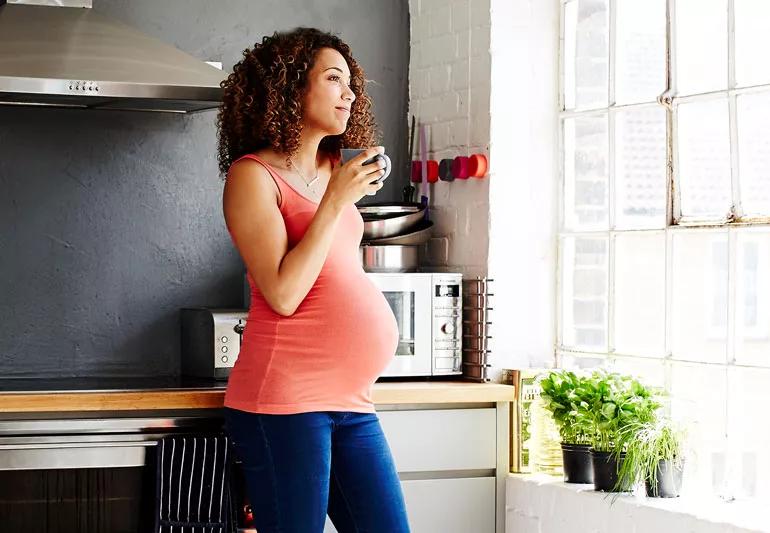Limit your caffeine intake to no more than 200 mg a day, including caffeinated foods

Ah, nothing beats that first sip of coffee first thing in the morning. Pre-pregnancy, that first cup of coffee, tea or soft drink helped kickstart your day.
Advertisement
Cleveland Clinic is a non-profit academic medical center. Advertising on our site helps support our mission. We do not endorse non-Cleveland Clinic products or services. Policy
Now that you’re expecting, is it safe to drink caffeine or is it wise to hold off completely? Ob/Gyn Monica Svets, MD, talks about whether or not it’s safe to drink caffeine while pregnant and how it can affect fetal development.
Most people get their liquid caffeine fix with a soft drink, energy drink, tea or coffee. If you’re pregnant, the American Pregnancy Organization recommends you limit your caffeine intake to 200 mg a day and this includes food with caffeine, too.
But how do you know if you’re reaching your limit? Caffeine can be found in the following, and the amount can range from brand to how it’s prepared:
“Be sure to let your doctor know how much caffeine you drink or eat so they can help guide you toward the right caffeine intake level,” says Dr. Svets.
During pregnancy, it can take longer for your body to metabolize caffeine. This means that you might have caffeine in your bloodstream for a while after you drink coffee or other caffeinated beverages. You might hear this called “caffeine clearance,” which refers to how long it takes the caffeine to leave your bloodstream.
Advertisement
The placenta provides your fetus with food and oxygen through the umbilical cord. Because of this, when you drink coffee or other caffeinated beverages, the fetus will be on the receiving end of it. While there are studies that have conflicting evidence, it’s best to keep your caffeine intake to under 200 mg.
One study found that the amount of caffeine ingested while pregnant wouldn’t have an effect on the baby’s sleep during the first three months of their life.
Researchers at the University of Pelotas looked at the children of nearly 900 women who consumed caffeine in pregnancy. They found caffeine consumption during pregnancy did not affect their baby’s sleep during the first three months. They also looked at women who consumed both caffeine and breastfed and found similar results.
When it comes to breastfeeding, it’s possible your baby can feel the effects of caffeine. Another study reported that poor sleep patterns and fussiness was prevalent in babies whose mothers drank about 10 or more cups of coffee daily while breastfeeding. Those who drank more than 450 ml of coffee daily may have less iron in their breast milk.
“One cup of average brewed coffee is about 137 milligrams of caffeine and the studies all looked at 200 milligrams as being the cutoff,” says Dr. Svets. “So, if you have just one cup of brewed coffee a day, you should be fine.”
The American College of Obstetricians and Gynecologists also maintains the recommendation that moderate caffeine consumption does not appear to be a major contributing factor in miscarriage or preterm birth.
If you’re unsure of how much caffeine is too much and have questions about your diet, talk to your doctor so you can both make the right decision for you and your baby.
Advertisement
Learn more about our editorial process.
Advertisement

Most rashes aren’t dangerous — but it’s worth talking to your pregnancy provider about them

The best available evidence indicates that, used correctly, acetaminophen is safe to take throughout a pregnancy

Prenatal massage, done properly, is a safe and effective way to lower stress and relieve pregnancy discomforts

Avoid high-mercury fish and processed meat, and go easy on salt and caffeine

Unless your healthcare provider tells you otherwise, it’s typically considered safe to have sex during pregnancy

Hot tubs and saunas raise your body temperature and can pose risks

Baths can be safe if you turn down the temp, avoid irritating bath products and take extra precautions against

SSRIs are the safest antidepressants to take in pregnancy — and pose less risk than unmanaged depression

Wearing a scarf, adjusting your outdoor activities and following your asthma treatment plan can help limit breathing problems

Your diet in the weeks, days and hours ahead of your race can power you to the finish line

When someone guilt trips you, they’re using emotionally manipulative behavior to try to get you to act a certain way